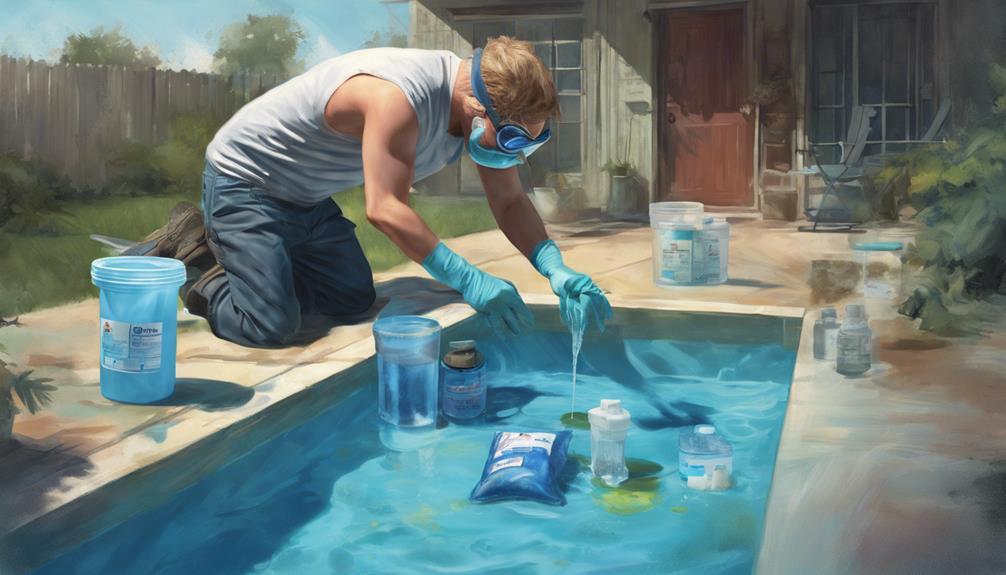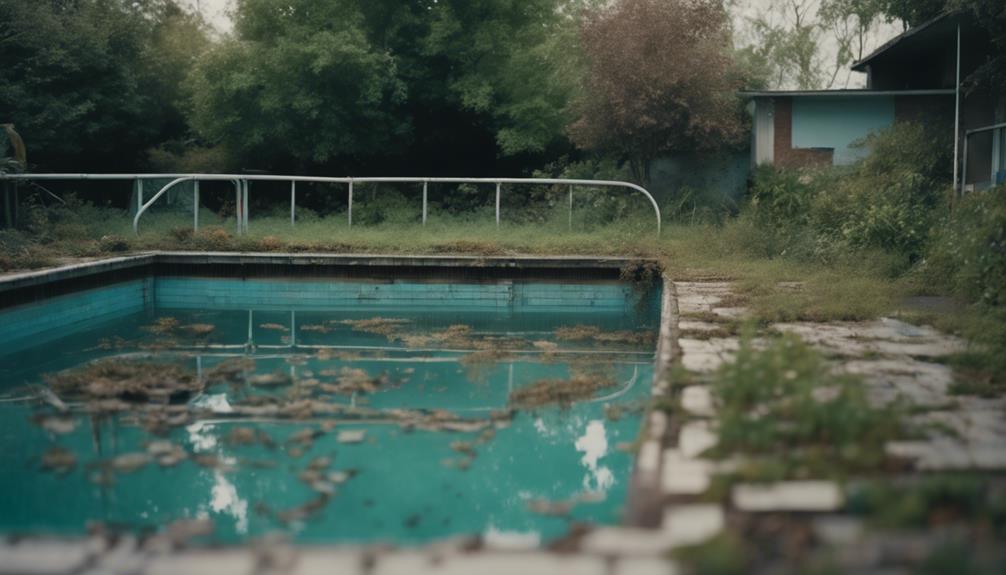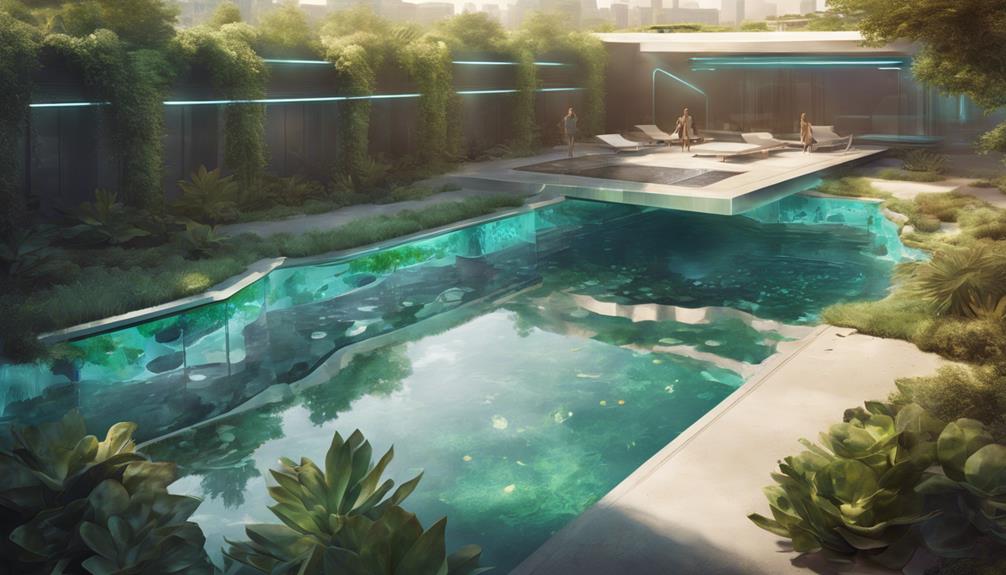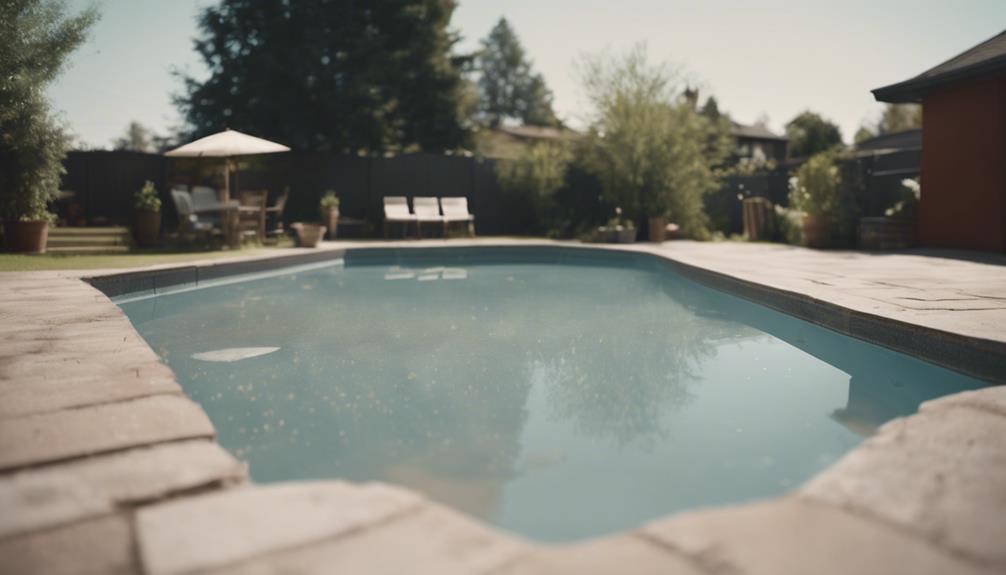To achieve crystal clear water in your pool, understanding pool chemicals is essential. Maintaining the optimal pH balance is crucial for ensuring excellent water quality. Utilizing chemicals such as dry acid, muriatic acid, and soda ash can effectively adjust pH levels. It is important to regularly monitor the chemical balance with pool testing kits to ensure proper maintenance. While test strips offer a convenient method for quick water chemistry checks, advanced testing kits provide more precise results. Essential pool chemicals like chlorine tablets, pH adjusters, and water balancers work in unison to keep your pool sparkling clean. Explore more about mastering pool chemicals for pristine water quality.
Key Takeaways
- Maintain pH balance within 7.2-7.6 range.
- Use chemicals like dry acid, muriatic acid, or soda ash for pH adjustment.
- Regularly test pool water for pH, chlorine, and alkalinity levels.
- Follow instructions for accurate chemical dosing and handling.
- Utilize chlorine tablets, pH adjusters, and test kits for balanced water maintenance.
Understanding Ph Balance
Maintaining the pH balance of a pool is vital for preventing surface corrosion and skin irritation, as it measures the acidity level on a scale of 0-14. The ideal pH range for pools falls between 7.2-7.6. Deviations from this range can lead to issues such as equipment damage and discomfort for swimmers.
To adjust pH levels, pool owners can utilize chemicals like dry acid, muriatic acid, or soda ash. Regular monitoring and maintenance are important to make certain that the pool remains within the recommended pH range.
Chemicals for Ph Balance
To effectively manage the pH balance of a pool, it is essential to understand the various chemicals used to adjust and maintain pH levels. These chemicals play an important role in ensuring the water remains within the ideal pH range of 7.2-7.6.
Here are three necessary chemicals for pH balance:
- Dry acid: Used to lower pH levels in the pool water.
- Muriatic acid: Another option for decreasing pH levels effectively.
- Soda ash: Helps to increase pH and maintain it at the desired range.
Proper handling, storage, and dosage of these chemicals are crucial to prevent any adverse effects on pool water quality and user safety. Regular monitoring and adjustment of pH levels are key to maintaining a healthy and balanced pool environment.
Pool Testing Kit Importance

Regular monitoring of pool chemical levels is necessary to guarantee water quality and safety. Investing in a pool testing kit is vital for accurate and reliable measurements. These kits typically measure pH, chlorine, alkalinity, and calcium hardness levels in the pool water.
By consistently testing these parameters, pool owners can make sure that the chemical balance is maintained within the recommended ranges. The testing process involves taking a water sample, adding specific reagents, and comparing the results to a color chart for analysis.
Pool testing kits provide an effective way to monitor and adjust chemical levels, ultimately helping to keep the pool water clear, balanced, and safe for swimmers. Regular use of these kits is a fundamental component of proper pool maintenance.
Swimming Pool Test Strips
How do swimming pool test strips provide quick chemical readings for pool owners?
Swimming pool test strips offer a convenient way to monitor pool water chemistry swiftly. By simply dipping a test strip into the water and comparing the resulting color to a provided chart, pool owners can quickly assess key chemical levels.
However, while test strips are handy for regular monitoring, they may not always provide the same level of accuracy as more advanced testing kits. It is essential to follow the instructions carefully for accurate readings and proper chemical adjustments.
- Quick and convenient testing method
- Color comparison to reference chart
- Ideal for routine monitoring of chemical levels
Essential Pool Chemicals

Key chemicals necessary for maintaining proper pool water balance include chlorine tablets, pH adjusters, and essential test kits for routine monitoring.
Chlorine tablets are essential for sanitizing the water and preventing algae growth.
pH adjusters like dry acid, muriatic acid, and soda ash help regulate the acidity level, guaranteeing swimmer comfort and preventing damage to the pool surfaces.
Test kits are crucial for measuring pH, chlorine, alkalinity, and calcium hardness levels, enabling accurate adjustments as needed.
Additionally, oxidizers such as calcium hypochlorite, water balancers like alkalinity and calcium hardness increasers, chlorine neutralizers, and water clarity chemicals such as algaecides and enzymes are necessary for maintaining a safe and crystal-clear pool environment.
Regularly stocking and using these chemicals in proper quantities will help ensure a well-balanced pool.
Frequently Asked Questions
How Often Should I Shock My Pool to Maintain Water Clarity?
Regularly shock your pool every 1-2 weeks to maintain water clarity. Shocking eliminates contaminants, restores chlorine efficiency, and prevents algae growth. Adjust frequency based on pool usage, weather conditions, and test results. Follow manufacturer's instructions for best results.
Can I Use Household Vinegar to Adjust Ph Levels in My Pool?
Household vinegar is not recommended for adjusting pH levels in pools. Its acidic nature can disrupt the pool's chemical balance. Opt for pool-specific products like dry acid, muriatic acid, or soda ash for safe and effective pH adjustments. Regular monitoring is key.
Is It Safe to Mix Different Pool Chemicals Together for Convenience?
Mixing different pool chemicals together for convenience is unsafe and can lead to dangerous reactions. Chemicals may produce harmful gases, explosions, or fires. Always follow manufacturer instructions, consult a professional, and store chemicals separately.
What Is the Best Way to Dispose of Expired Pool Chemicals?
Disposing expired pool chemicals safely is important. According to the EPA, improper disposal can harm the environment and human health. Contact your local waste management facility for guidelines on how to handle and dispose of expired pool chemicals properly.
Are There Any Eco-Friendly Alternatives to Traditional Pool Chemicals?
Eco-friendly alternatives to traditional pool chemicals include enzyme-based cleaners, natural clarifiers, and mineral-based sanitizers. These options are less harsh on the environment, promoting sustainable pool maintenance while ensuring a safe swimming experience.
Can the Tips for Saltwater Pools also Apply to Regular Pools for Crystal-Clear Water?
Yes, the tips for crystal-clear saltwater pool maintenance can also apply to regular pools. Proper water circulation, filtration, and regular testing and balancing of chemicals are essential for maintaining clarity in all types of pools. Following these crystalclear saltwater pool tips will help keep regular pools sparkling clean.
Conclusion
To wrap up, attaining crystal-clear water in your pool necessitates mastering the delicate balance of pool chemicals. By grasping the significance of pH levels, utilizing a variety of chemicals for adjustments, and consistently testing the water, you can prevent surface corrosion and skin irritation.
Investing in a dependable pool testing kit and keeping swimming pool test strips within reach are essential steps in maintaining proper chemical levels. With meticulous care and attention to detail, you can indulge in a revitalizing and safe swimming experience in your pool.










